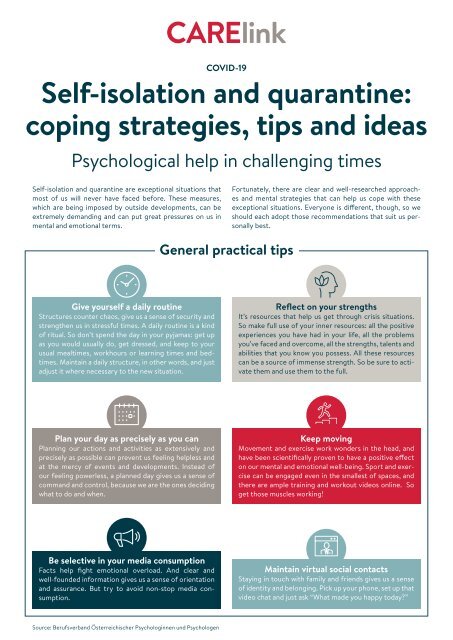Covid-19 : Self-isolation and quarantine
Self-isolation and quarantine are exceptional situations that most of us will never have faced before.
Self-isolation and quarantine are exceptional situations that most of us will never have faced before.
- No tags were found...
You also want an ePaper? Increase the reach of your titles
YUMPU automatically turns print PDFs into web optimized ePapers that Google loves.
COVID-<strong>19</strong><br />
<strong>Self</strong>-<strong>isolation</strong> <strong>and</strong> <strong>quarantine</strong>:<br />
coping strategies, tips <strong>and</strong> ideas<br />
Psychological help in challenging times<br />
<strong>Self</strong>-<strong>isolation</strong> <strong>and</strong> <strong>quarantine</strong> are exceptional situations that<br />
most of us will never have faced before. These measures,<br />
which are being imposed by outside developments, can be<br />
extremely dem<strong>and</strong>ing <strong>and</strong> can put great pressures on us in<br />
mental <strong>and</strong> emotional terms.<br />
Fortunately, there are clear <strong>and</strong> well-researched approaches<br />
<strong>and</strong> mental strategies that can help us cope with these<br />
exceptional situations. Everyone is different, though, so we<br />
should each adopt those recommendations that suit us personally<br />
best.<br />
General practical tips<br />
Give yourself a daily routine<br />
Structures counter chaos, give us a sense of security <strong>and</strong><br />
strengthen us in stressful times. A daily routine is a kind<br />
of ritual. So don’t spend the day in your pyjamas: get up<br />
as you would usually do, get dressed, <strong>and</strong> keep to your<br />
usual mealtimes, workhours or learning times <strong>and</strong> bedtimes.<br />
Maintain a daily structure, in other words, <strong>and</strong> just<br />
adjust it where necessary to the new situation.<br />
Reflect on your strengths<br />
It’s resources that help us get through crisis situations.<br />
So make full use of your inner resources: all the positive<br />
experiences you have had in your life, all the problems<br />
you’ve faced <strong>and</strong> overcome, all the strengths, talents <strong>and</strong><br />
abilities that you know you possess. All these resources<br />
can be a source of immense strength. So be sure to activate<br />
them <strong>and</strong> use them to the full.<br />
Plan your day as precisely as you can<br />
Planning our actions <strong>and</strong> activities as extensively <strong>and</strong><br />
precisely as possible can prevent us feeling helpless <strong>and</strong><br />
at the mercy of events <strong>and</strong> developments. Instead of<br />
our feeling powerless, a planned day gives us a sense of<br />
comm<strong>and</strong> <strong>and</strong> control, because we are the ones deciding<br />
what to do <strong>and</strong> when.<br />
Keep moving<br />
Movement <strong>and</strong> exercise work wonders in the head, <strong>and</strong><br />
have been scientifically proven to have a positive effect<br />
on our mental <strong>and</strong> emotional well-being. Sport <strong>and</strong> exercise<br />
can be engaged even in the smallest of spaces, <strong>and</strong><br />
there are ample training <strong>and</strong> workout videos online. So<br />
get those muscles working!<br />
Be selective in your media consumption<br />
Facts help fight emotional overload. And clear <strong>and</strong><br />
well-founded information gives us a sense of orientation<br />
<strong>and</strong> assurance. But try to avoid non-stop media consumption.<br />
Maintain virtual social contacts<br />
Staying in touch with family <strong>and</strong> friends gives us a sense<br />
of identity <strong>and</strong> belonging. Pick up your phone, set up that<br />
video chat <strong>and</strong> just ask “What made you happy today?”<br />
Source: Berufsverb<strong>and</strong> Österreichischer Psychologinnen und Psychologen
1. How to deal with fears <strong>and</strong> concerns<br />
Extraordinary times <strong>and</strong> situations can expose us to new stresses <strong>and</strong> unfamiliar emotions. And these new circumstances<br />
<strong>and</strong> challenges take time to get used to.<br />
• Limit your media consumption<br />
Make a conscious decision to structure (<strong>and</strong> limit!) your<br />
consumption of the latest media updates on COVID-<strong>19</strong>.<br />
Constant exposure to stories <strong>and</strong> images on the subject,<br />
even if these are from more reputable media sources, does<br />
not help to master the situation, <strong>and</strong> can actually lead to<br />
greater worry <strong>and</strong> stress.<br />
• Don’t listen to the scaremongers<br />
Set your own limits <strong>and</strong> avoid taking in the masses of text<br />
messages, emails, videos, WhatsApps <strong>and</strong> social media<br />
comments on COVID-<strong>19</strong>.<br />
• Focus on the positives<br />
Focusing on positive content can give us a sense of calm<br />
<strong>and</strong> stability. Talk to the people who mean most to you <strong>and</strong><br />
keep the conversation positive.<br />
• Listen to your feelings<br />
We’re all experiencing a wide range of emotions – fear,<br />
stress, confusion <strong>and</strong> more – in the present exceptional situation.<br />
These are perfectly underst<strong>and</strong>able. But too much<br />
of them can be simply overwhelming. So take the time to<br />
take in <strong>and</strong> express what you are feeling. Some people may<br />
want to write their feelings down, or put them to creative<br />
use (such as in painting, music or meditation).<br />
• Talk about your feelings<br />
If you feel the need to discuss your feelings, do so with someone<br />
you feel close to <strong>and</strong> comfortable with.<br />
If you don’t have such a person available to you, you could<br />
also seek professional help, from a helpline or from a psychologist<br />
offering telephone (e.g. Skype) assistance <strong>and</strong><br />
advice.<br />
• Don’t brood too much<br />
Brooding is one of our many strategies for dealing with<br />
stress situations. But too much brooding can be counterproductive,<br />
because it actually causes additional stress. So<br />
think in advance of what activities you could undertake if<br />
you find yourself “over-brooding”. This could be doing something<br />
completely different that makes you feel good:<br />
baking, reading, writing… whatever you enjoy.<br />
• Do some simple relaxation exercises<br />
Fear <strong>and</strong> relaxation just don’t get along. So doing some<br />
relaxation exercises can help reduce your fears. You’ll find<br />
instructions for a host of such relaxation exercises online.<br />
• Remember: this too will pass!<br />
It’s very important to remember that this outbreak of CO-<br />
VID-<strong>19</strong> won’t be around forever. Just take every possible<br />
action to minimize your own risk of infection, such as washing<br />
your h<strong>and</strong>s regularly <strong>and</strong> thoroughly with soap <strong>and</strong><br />
water <strong>and</strong> avoiding close personal contacts. Also: be sure<br />
to spend some time planning all the things you intend to do<br />
once the whole thing is over!<br />
2. How to help children <strong>and</strong> adolescents cope<br />
Isolation is an imposition. So the paramount objective in any <strong>isolation</strong> is to get through it with as little stress as possible.<br />
Isolation is not about making you a better family. So debating how best to raise the children or resolving conflict issues<br />
with our partner should not be the focus of our energies in such times.<br />
• Keep to your usual daily structure <strong>and</strong> routine.<br />
• Clearly plan learning <strong>and</strong> play times.<br />
• Clearly define certain times when everyone does something<br />
for themselves.<br />
• Do some activities together.<br />
• Make sure there are places people can withdraw to, to<br />
prevent or reduce conflicts.<br />
• Give your child(ren) opportunities for physical activity as<br />
far as is currently possible.<br />
• Draw up rules together on how to make the best use of<br />
the time you now have available.<br />
• Set limits with your child(ren) on the “screen times” for<br />
TV, the computer <strong>and</strong> the mobile phone.<br />
• Explain the situation to your child(ren) in age-appropriate<br />
terms.<br />
• Accept that your child(ren) may be more “clingy” than<br />
usual <strong>and</strong> give them this physical reassurance, too. What<br />
they now need most is to feel safe <strong>and</strong> secure.<br />
• Postpone any big child-raising debates or ambitions to<br />
more normal times, <strong>and</strong> try to minimize any punishments,<br />
too. Use praise <strong>and</strong> positive words to strengthen your<br />
child(ren) <strong>and</strong> motivate them to the action or behaviour<br />
desired.
3. How to deal with conflicts<br />
Sharing a confined space for longer than usual generates stresses of its own. The unusually high volumes of time spent<br />
together can also create tensions <strong>and</strong> conflicts between partners <strong>and</strong> within families. All of which can come out in arguments<br />
<strong>and</strong> even physical violence.<br />
• Clearly define certain times that each family member will<br />
spend alone.<br />
• Make sure that every family member has a place they can<br />
withdraw to.<br />
• Address any anger before the situation worsens.<br />
• Take an occasional solo walk around the block or into the<br />
woods.<br />
• Hold a daily “family check-in” meeting where each family<br />
member can say how they’re feeling, if they have any<br />
good ideas <strong>and</strong> if there’s anything they particularly want<br />
or need.<br />
• Be more tolerant than usual, with others <strong>and</strong> with yourself!<br />
This situation is a challenge for every family.<br />
• If you feel you need it, don’t be afraid to seek professional<br />
help.<br />
4. How to cope with boredom<br />
You may find that you suddenly have unusually large amounts of time at your disposal – because you’re not currently going<br />
to work, or because you can’t pursue your usual leisure interests. The important thing here is to still give yourself a daily<br />
structure <strong>and</strong> set yourself some achievable objectives.<br />
• Set yourself some fixed daily tasks.<br />
• Start working on “projects” that you’ve always been postponing,<br />
or do the little jobs you never seem to get around<br />
to.<br />
• Plan yourself a daily highlight that you can look forward<br />
to.<br />
• Keep in touch with people who are important to you.<br />
Share your (positive) news <strong>and</strong> views with them <strong>and</strong> plan<br />
things you want to do together once these <strong>isolation</strong> <strong>and</strong><br />
<strong>quarantine</strong> times are over.
5. How to h<strong>and</strong>le violence<br />
Sharing small spaces <strong>and</strong> being unable to spend time on our own or have intimate moments with our partner can lead to<br />
feelings of aggression <strong>and</strong> even violence. We need to take active steps to stop matters getting this far. And here are some<br />
ideas:<br />
• Recognize violence <strong>and</strong> call it what it is – in ourselves, too!<br />
Violence comes in many forms: hitting, shouting, denigrating,<br />
ignoring… So be honest with yourself. And if you notice<br />
that things are all starting to get too much <strong>and</strong> you’re<br />
showing signs of violence, take appropriate steps.<br />
• Phone a friend!<br />
If you feel you’re at your limits, phone a friend – even if it’s<br />
just to talk to somebody else. Do this from another room if<br />
possible. And breathe deeply. If all this is still not enough,<br />
call a helpline.<br />
• Don’t act the violence out!<br />
Negative emotions, tension <strong>and</strong> aggression are all perfectly<br />
normal in an exceptional situation. It’s not so terrible to<br />
have aggressive feelings towards someone. It only gets<br />
dangerous if you act on them!<br />
• If violence does occur, talk!<br />
If you notice that another adult in your home is becoming<br />
violent – towards children or adolescents in particular – talk<br />
to them. You may be the only person in this situation who is<br />
in a position to protect the child. Seek help in doing so, too:<br />
from an anti-violence telephone helpline, for instance, or<br />
from psychosocial services.<br />
• If you suffer violence yourself, get help!<br />
The same applies, of course, if you are the subject of violence<br />
yourself: if this happens, get help. What’s important<br />
here is not to remain alone. You may feel that you’re alone<br />
because of the self-<strong>isolation</strong>, but you aren’t. So get help:<br />
from friends, from counsellors, from an anti-violence helpline,<br />
from your family doctor or – if the violence is serious<br />
– from the police or the child protection agencies.<br />
• Above all, get help in good time!<br />
Don’t wait till it’s too late. All the above tips <strong>and</strong> advice – on<br />
boredom, on fears <strong>and</strong> worries <strong>and</strong> above all on conflicts<br />
– are designed to help us all cope with the unpleasant feelings<br />
that so often arise in tense situations… before these<br />
escalate <strong>and</strong> express themselves in violent actions.<br />
Foundation Carelink<br />
Sägereistrasse 20 • CH-8152 Glattbrugg<br />
P + 41 44 876 50 50 • www.carelink.ch

















